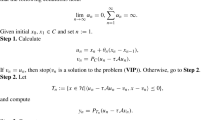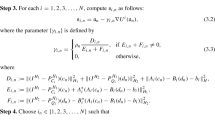Abstract
Adopting a suitable approximation strategy can both enhance the robustness and improve the efficiency of the numerical algorithms. In this paper, we suggest combining two approximation criteria, the absolute one and the relative one, to the asymmetric forward-backward-adjoint splitting (AFBA) algorithm for a class of convex-concave saddle point problems, resulting in two inexact AFBA variants. These two approximation criteria are low-cost, since verifying them just involves the subgradient of a certain function. For both the absolute error AFBA and the relative error AFBA, we establish the global convergence and the O(1/N) convergence rate measured by the gap function in the ergodic sense, where N is the number of iterations. For the absolute error AFBA, we show that it possesses an O(1/N2) (linear convergence) rate of convergence, under the assumption that a part of (both) the underlying functions are strongly convex. We report some numerical results which demonstrate the effectiveness of the proposed methods.






Similar content being viewed by others
Data availability
Data sharing not applicable to this article as no datasets were generated or analyzed during the current study.
References
Cai, X., Guo, K., Jiang, F., Wang, K., Wu, Z., Han, D.: The developments of proximal point algorithms. J. Oper. Res. Soc. China 10, 197–239 (2022)
Cai, X., Han, D., Xu, L.: An improved first-order primal-dual algorithm with a new correction step. J. Glob. Optim. 57, 1419–1428 (2013)
Chambolle, A., Ehrhardt, M. J., Richtárik, P., Schonlieb, C. -B.: Stochastic primal-dual hybrid gradient algorithm with arbitrary sampling and imaging applications. SIAM J. Optim. 28, 2783–2808 (2018)
Chambolle, A., Pock, T.: A first-order primal-dual algorithm for convex problems with applications to imaging. J. Math. Imaging Vis. 40, 120–145 (2011)
Chambolle, A., Pock, T.: On the ergodic convergence rates of a first-order primal–dual algorithm. Math. Program. 159, 253–287 (2016)
Chen, P., Huang, J., Zhang, X.: A primal–dual fixed point algorithm for convex separable minimization with applications to image restoration. Inverse Probl. 29, 025011 (2013)
Chen, P., Huang, J., Zhang, X.: A primal-dual fixed point algorithm for minimization of the sum of three convex separable functions. J. Fixed Point Theory Appl. 2016, 1–18 (2016)
Condat, L.: A primal–dual splitting method for convex optimization involving Lipschitzian, proximable and linear composite terms. J. Optim. Theory Appl. 158, 460–479 (2013)
Eckstein, J., Silva, P. J.: A practical relative error criterion for augmented Lagrangians. Math. Program. 141, 319–348 (2013)
Eckstein, J., Yao, W.: Approximate ADMM algorithms derived from Lagrangian splitting. Comput. Optim. Appl. 68, 363–405 (2017)
Eckstein, J., Yao, W.: Relative-error approximate versions of Douglas–Rachford splitting and special cases of the ADMM. Math. Program. 170, 417–444 (2018)
Esser, E., Zhang, X., Chan, T. F.: A general framework for a class of first order primal-dual algorithms for convex optimization in imaging science. SIAM J. Imaging Sci. 3, 1015–1046 (2010)
Han, D.: A survey on some recent developments of alternating direction method of multipliers. J. Oper. Res. Soc. China 10, 1–52 (2022)
Han, D., He, H., Yang, H., Yuan, X.: A customized Douglas–Rachford splitting algorithm for separable convex minimization with linear constraints. Numer. Math. 127, 167–200 (2014)
He, B., Yuan, X.: Convergence analysis of primal-dual algorithms for a saddle-point problem: from contraction perspective. SIAM J. Imaging Sci. 5, 119–149 (2012)
He, H., Desai, J., Wang, K.: A primal–dual prediction–correction algorithm for saddle point optimization. J. Glob. Optim. 66, 573–583 (2016)
He, Y., Monteiro, R. D.: An accelerated HPE-type algorithm for a class of composite convex-concave saddle-point problems. SIAM J. Optim. 26, 29–56 (2016)
Hien, L. T. K., Zhao, R., Haskell, W. B.: An inexact primal-dual smoothing framework for large-scale non-bilinear saddle point problems, arXiv preprint arXiv:1711.03669 (2017)
Jalilzadeh, A.: Primal-dual incremental gradient method for nonsmooth and convex optimization problems. Optim. Lett. 15, 2541–2554 (2021)
Jiang, F., Cai, X., Wu, Z., Han, D.: Approximate first-order primal-dual algorithms for saddle point problems. Math. Comput. 90, 1227–1262 (2021)
Jiang, F., Wu, Z., Cai, X., Zhang, H.: A first-order inexact primal-dual algorithm for a class of convex-concave saddle point problems. Numer. Algorithms 88, 1109–1136 (2021)
Jiang, F., Wu, Z., Cai, X., Zhang, H.: Unified linear convergence of first-order primal-dual algorithms for saddle point problems. Optim. Lett. 16, 1675–1700 (2022)
Latafat, P., Patrinos, P.: Asymmetric forward–backward–adjoint splitting for solving monotone inclusions involving three operators. Comput. Optim. Appl. 68, 57–93 (2017)
Liu, Y., Xu, Y., Yin, W.: Acceleration of primal-dual methods by preconditioning and simple subproblem procedures. J. Sci. Comput. 86, 1–34 (2021)
Malitsky, Y., Pock, T.: A first-order primal-dual algorithm with linesearch. SIAM J. Optim. 28, 411–432 (2018)
Morini, B., Porcelli, M., Chan, R. H.: A reduced newton method for constrained linear least-squares problems. J. Comput. Appl. Math. 233, 2200–2212 (2010)
Nam, S., Davies, M. E., Elad, M., Gribonval, R.: The cosparse analysis model and algorithms. Appl. Comput. Harmon. Anal. 34, 30–56 (2013)
Parikh, N., Boyd, S., et al.: Proximal algorithms. Foundations and TrendsⓇ, in Optimization 1, 127–239 (2014)
Rasch, J., Chambolle, A.: Inexact first-order primal-dual algorithms. Comput. Optim. Appl. 2, 381–430 (2020)
Rebegoldi, S., Calatroni, L.: Scaled, inexact, and adaptive generalized fista for strongly convex optimization. SIAM J. Optim. 32, 2428–2459 (2022)
Shi, F., Cheng, J., Wang, L., Yap, P. -T., Shen, D.: Low-rank total variation for image super-resolution. In: International Conference on Medical Image Computing and Computer-Assisted Intervention, Springer, pp 155–162 (2013)
Shi, F., Cheng, J., Wang, L., Yap, P. -T., Shen, D.: LRTV: MR image super-resolution with low-rank and total variation regularizations. IEEE Trans. Med. Imaging 34, 2459–2466 (2015)
Tan, Z., Eldar, Y. C., Beck, A., Nehorai, A.: Smoothing and decomposition for analysis sparse recovery. IEEE Trans. Signal Process. 62, 1762–1774 (2014)
Vũ, B. C.: A splitting algorithm for dual monotone inclusions involving cocoercive operators. Adv. Comput. Math. 38, 667–681 (2013)
Wang, K., He, H.: A double extrapolation primal-dual algorithm for saddle point problems. J. Sci. Comput. 85, 1–30 (2020)
Xie, J.: on inexact ADMMs with relative error criteria. Comput. Optim. Appl. 71, 743–765 (2018)
Yan, M.: A new primal-dual algorithm for minimizing the sum of three functions with a linear operator. J. Sci. Comput. 76, 1698–1717 (2018)
Zhu, M., Chan, T.: An efficient primal-dual hybrid gradient algorithm for total variation image restoration, UCLA CAM Report, 34 (2008)
Funding
This research was partially supported by the National Natural Science Foundation of China (Nos. 11625105, 11871279, 12131004, 12126603, and 12201309) and the Startup Foundation for Introducing Talent of NUIST (No. 2022r027).
Author information
Authors and Affiliations
Contributions
All authors contributed equally to the manuscript and read and approved the final manuscript.
Corresponding author
Ethics declarations
Ethical approval and consent to participate
Not applicable.
Consent for publication
All authors approved the final manuscript and the submission to this journal.
Human and animal ethics
Not applicable.
Competing interests
The authors declare no competing interests.
Additional information
Publisher’s note
Springer Nature remains neutral with regard to jurisdictional claims in published maps and institutional affiliations.
Rights and permissions
Springer Nature or its licensor (e.g. a society or other partner) holds exclusive rights to this article under a publishing agreement with the author(s) or other rightsholder(s); author self-archiving of the accepted manuscript version of this article is solely governed by the terms of such publishing agreement and applicable law.
About this article
Cite this article
Jiang, F., Cai, X. & Han, D. Inexact asymmetric forward-backward-adjoint splitting algorithms for saddle point problems. Numer Algor 94, 479–509 (2023). https://doi.org/10.1007/s11075-023-01509-w
Received:
Accepted:
Published:
Issue Date:
DOI: https://doi.org/10.1007/s11075-023-01509-w




